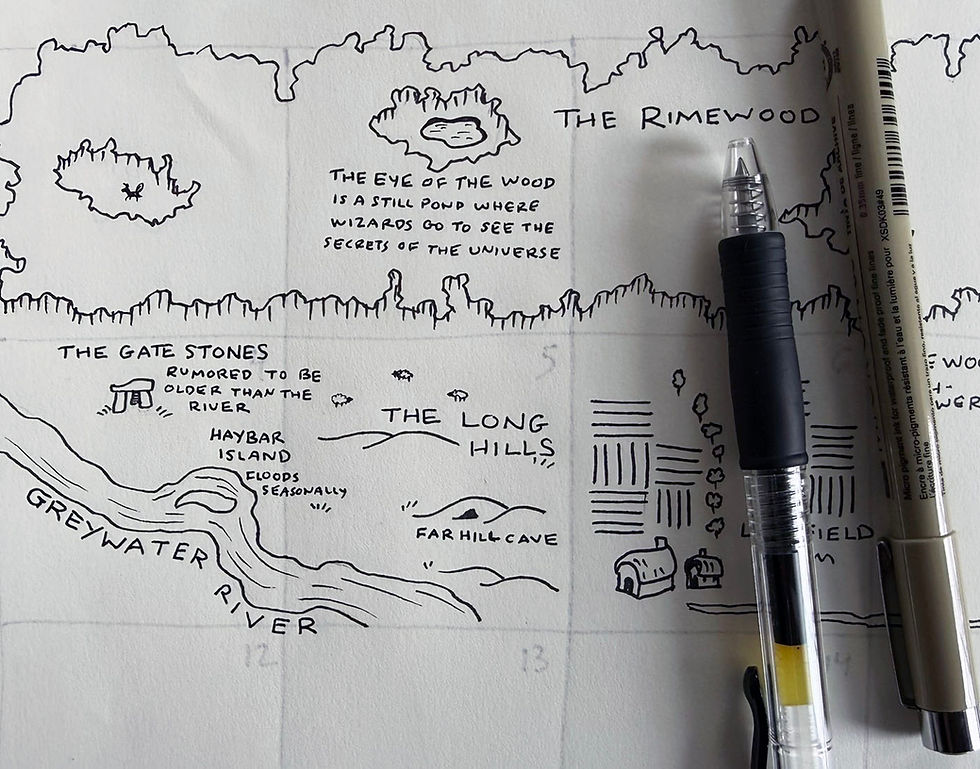Dear Diary... My Game Just Got Weird
- chris9956
- Oct 27, 2025
- 4 min read
A Beginners Guide to Journaling Your Solo RPG Adventures

Last Call in Arkham is at the final playtesting and editing stage, and one of my favorite guinea pigs... uh... I mean early readers mentioned that he’s not really sure how to journal a solo RPG. It occurred to me that this might be the number one obstacle for new solo players. So, what is the right way to journal a solo RPG?
The good news is you have a lot of options and whichever one sparks your enthusiasm is the “right way.” Not every solo RPG leans on long-form writing. Sometimes a hex crawl or investigation game is better captured through a field journal, a developing map, or a trail of clues. With that in mind, let’s put together a toolbox of journaling styles you can use on your solo adventures.
The Written Styles
When people think of journaling in solo RPGs, the first thing that usually comes to mind is long-form prose, but not every gamer also wants to be a novelist. I think this is one of those misconceptions that turns people off from giving solo gaming a try. You don’t have to be the next Tolkien to journal your game. In fact, no one ever needs to see your adventure. If you decide that you want to try this style, don’t worry about spelling or grammar, or penmanship. This is just for you.
“But Chris,” I hear you say, “I hated writing in school, and I don’t want to do it now. Am I just out of luck?” If writing long paragraphs sounds like a chore and keeps you from trying a solo RPG, skip it. Take short notes instead. If you play in a group game, you’re probably already doing this with a sentence or two to track what matters for future reference. And if it still feels like too much writing? Go even simpler. Bullet points or short phrases get the job done and can be enough to jog your memory when you need to remember where you are in the story. "Journaling" can mean nothing more than "I took some notes".
Now, somewhere between these two extremes of ALLLLL the notes and tiny reminders is fertile creative ground if you want to go the written route. Maybe you are corresponding with someone back home. Perhaps you are keeping a field journal, a case book, a reporter’s notebook, or maybe just a datebook of occurrences. This “brief notes” style is particularly fitting for Last Call in Arkham, since how detailed are you likely to be on a monster-fighting pub crawl?
Of course, you could go full James Joyce and write a wild, stream of consciousness epic and make notes of every thought that passes through your character’s head, but if you’re still not feeling the whole “words on a page” thing? No problem. Let’s talk about using your voice instead.
Audio Journaling
When people ask me where they should start on their solo RPG journey, my go-to recommendation is always Void 1680 AM by Ken Lowrey. The journaling that happens in this game comes from playlists. Sure, there’s opportunity to create a more involved adventure, but you don’t have to write down a single word. The playlist does the talking.
If you like telling stories, but not the physical act of writing, go with recordings instead. Voice memos on your phone (or recorder of choice) not only capture what is said, but can also transcribe it into written form for easy browsing later.
If you are musically inclined, don’t tell your story through prose at all. Maybe the adventure inspires a song instead. Solo RPGs are amazing fuel for creativity, and these stories can just as easily be sung as written. Who knows? Your solo game might end up as a whole EP, concept album, or even a one-person opera!
Weird Little Art Projects
Now we’re getting into the territory that I find the most interesting – the artistic journal. As someone who loves creating props and artifacts for games, solo RPGs are a playground for fun creations. I am fascinated with the aesthetic of junk journals, but they so often lack the element of story. I want those moody, mysterious pages to hold some kind of secret and what could be more perfect than an adventure told through notes and found artifacts?
Maybe you love to draw. Your journal could be a sketchbook tour of your journey. Maybe you go all in and turn it into a comic. If those ideas are too time-consuming, symbols and doodles get the job done. Your “journal” could be an artifact box filled with mementos, a mood board or collage, a stack of postcards, or even a trail of sticky notes. Scrap Yarn’s first solo RPG The Sylvan has players tell a story through map making. If you can create it, it can be used to tell a story. Dust off those art supplies, pick out that solo game you’ve been meaning to try and get playing!
Tell It Your Way
At the end of the day, how you journal your solo RPG is entirely up to you. Write it, speak it, sketch it, collage it – there is no wrong answer as long as it keeps you excited about the adventure you’re creating. Solo RPGs are about unleashing your imagination and telling a story that is yours alone. So get weird, be messy, and have fun. The most important part is simply hitting play.





Comments